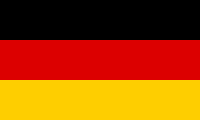 Germany (/ˈdʒɜrməni/), officially the Federal Republic of Germany (German: Bundesrepublik Deutschland,pronounced [ˈbʊndəsʁepuˌbliːk ˈdɔʏtʃlant]), is a country in Western Europe. It is bordered to the north by the North Sea, Denmark, and the Baltic Sea; to the east by Poland and the Czech Republic; to the south by Austria and Switzerland; and to the west by France, Luxembourg, Belgium, and the Netherlands. The territory of Germany covers 357.021 km2 and is influenced by a temperate seasonal climate. With 81.8 million inhabitants, it is the most populous member state of the European Union, and home to the third-largest number of international migrants worldwide.
Germany (/ˈdʒɜrməni/), officially the Federal Republic of Germany (German: Bundesrepublik Deutschland,pronounced [ˈbʊndəsʁepuˌbliːk ˈdɔʏtʃlant]), is a country in Western Europe. It is bordered to the north by the North Sea, Denmark, and the Baltic Sea; to the east by Poland and the Czech Republic; to the south by Austria and Switzerland; and to the west by France, Luxembourg, Belgium, and the Netherlands. The territory of Germany covers 357.021 km2 and is influenced by a temperate seasonal climate. With 81.8 million inhabitants, it is the most populous member state of the European Union, and home to the third-largest number of international migrants worldwide.
A region named Germania, inhabited by several Germanic peoples, was documented before AD 100. Beginning in the 10th century, German territories formed a central part of the Holy Roman Empire, which lasted until 1806. During the 16th century, northern Germany became the centre of the Protestant Reformation. As a modern nation-state, the country was first unified amidst the Franco-Prussian War in 1871. After World War II, Germany was divided in 1949 into two separate states—East Germany and West Germany — along the lines of Allied occupation. Germany was reunified in 1990. West Germany was a founding member of the European Community in 1957, which became the European Union in 1993. It is part of the Schengen Area and adopted the European currency, the euro, in 1999.
Germany is a federal parliamentary republic of sixteen states. The capital and largest city is Berlin. Germany is a member of the United Nations, NATO, G8, G20, and the OECD. It is a major power with the world’s fourth largest economy by nominal GDP and the fifth largest in purchasing power parity. It is the second largest exporter and third largest importer of goods. In absolute terms, Germany allocates the third biggest annual budget of development aid in the world, while its military expenditure ranked seventh. The country has developed a high standard of living and a comprehensive system of social security. It holds a key position in European affairs and maintains a multitude of close partnerships on a global level. Germany is recognised as a scientific and technological leader in several fields.
Germany is historically called Das Land der Dichter und Denker (the land of poets and thinkers). German culture began long before the rise of Germany as a nation-state and spanned the entire German-speaking world. From its roots, culture in Germany has been shaped by major intellectual and popular currents in Europe, both religious and secular. As a result, it is difficult to identify a specific German tradition separated from the larger framework of European high culture. Another consequence of these circumstances is the fact that some historical figures, such as Wolfgang Amadeus Mozart, Franz Kafka and Paul Celan, though not citizens of Germany in the modern sense, must be considered in the context of the German cultural sphere in order to understand their historical situation, work and social relations.
The former West Germany has for many years benefited from a highly skilled population that enjoys a high standard of living and an extensive social welfare program. Since unification, however, Germany has faced the economic challenge of transforming the former East Germany from a deteriorating command economy dependent on low-quality heavy industrial products to a technologically advanced market economy. Unemployment in the east has remained consistently higher than that in the west, and although several larger urban centers there have begun to revive economically, most E German industrial cities remain depressed. Since the postwar years, the German economy has emphasized management-labor consensus, which, while generally avoiding labor strife, has also created a relatively inflexible labor environment where employers are reluctant to hire more than the minimum required number of skilled workers, since it is difficult to fire them once they are hired.
Notes from Wikipedia and Answers.com









